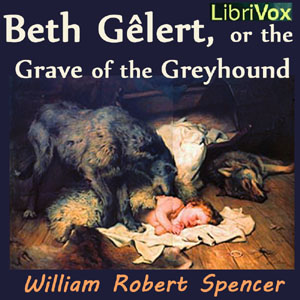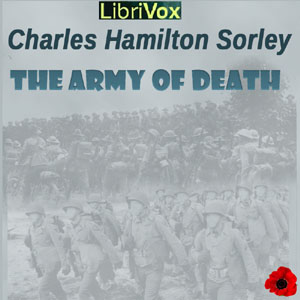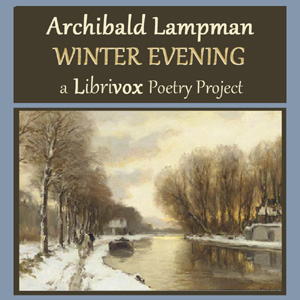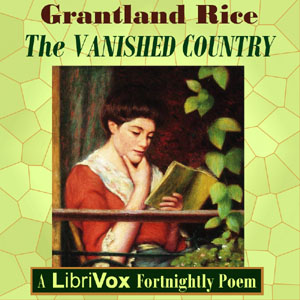LibriVox volunteers bring you 12 recordings of Youth's Spring-Tribute by Dante Gabriel Rossetti. This was the Weekly Poetry Poetry project for April 15, 2012.Dante Gabriel Rossetti was an English poet, illustrator, painter and translator. His early poetry was influenced by John Keats. His later poetry was characterised by the complex interlinking of thought and feeling, especially in his sonnet sequence The House of Life. Poetry and image are closely entwined in Rossetti's work. (Summary by Wikipedia)
12 episodes
LibriVox volunteers bring you 16 recordings of Beth Gêlert, or the Grave of the Greyhound by William Robert Spencer. This was the Fortnightly Poetry project for July 8, 2012.William Robert Spencer, English poet and wit, was the younger son of Lord Charles Spencer and his wife Mary Beauclerk. Spencer's wit made him a popular member of society. He belonged to the Whig set of Charles James Fox and Richard Brinsley Sheridan and was frequently a guest of the prince of Wales. He did not desire a public life, being content as a writer of "occasional" verse and vers de société.His writings were greatly appreciated by his contemporaries, being warmly praised by such figures as Sir Walter Scott, John Wilson, and Lord Byron. ( Summary from Wikipedia )
16 episodes
LibriVox volunteers bring you 20 recordings of After Long Grief by Madison Cawein. This was the Weekly Poetry project for July 22, 2012.Madison Cawein was a poet from Louisville, Kentucky. His father made patent medicines from herbs. Cawein thus became acquainted with and developed a love for local nature as a child. His output was thirty-six books and 1,500 poems. His writing presented Kentucky scenes in a language echoing Percy Bysshe Shelley and John Keats. He soon earned the nickname the "Keats of Kentucky". (Summary from Wikipedia )
20 episodes
LibriVox readers present 7 versions of "Men of Harlech" by Talhaiarn. This was the weekly poem for the week of September 23, 2012.
"Men of Harlech" or "The March of the Men of Harlech" is a song and military march which is traditionally said to describe events during the seven year long siege of Harlech Castle between 1461 and 1468. The music was first published without words in 1794, but it is said to be a much earlier folk air. The song was published in Volume II of the 1862 collection Welsh Melodies with the Welsh lyrics by the Welsh poet John Jones (Talhaiarn). A version translated by John Oxenford was published in "The Songs of Wales" in 1873 with music edited by Brinley Richards. This is the version recorded in this week's poetry project. (Summary by Wikipedia)
7 episodes
LibriVox readers bring you 19 recordings of The Red Cross Spirit Speaks by John H. Finley.At this time of year, all around the world, we remember the fallen and those who served their countries in time of war and other calamity. This poem reminds us of the dedication of the Red Cross, and the comfort they brought and, together with the Red Crescent, still bring, to the wounded, dying and distressed. John Huston Finley headed the Red Cross Commission in Palestine during the First World War.
19 episodes
LibriVox volunteers bring you 16 recordings of The Meeting of the Waters by Thomas Moore. This was the Fortnightly Poetry project for November 25, 2102.
16 episodes
LibriVox volunteers bring you 18 recordings of A Poe-em of Passion by C. F. Lummis. This was the Weekly Poetry project for March 17, 2013, and is an amusing parody of Poe's Annabel Lee.
18 episodes
To take you back to your childhood, LibriVox volunteers bring you 28 recordings of The Star by Jane Taylor. This was the Weekly Poetry project for March 24, 2013.
28 episodes
LibriVox volunteers bring you 16 recordings of the haunting Ballad of Another Ophelia by D. H. Lawrence. This was the Fortnightly Poetry project for March 24, 2013.
16 episodes
LibriVox volunteers bring you 21 recordings of The Little Star, author unknown, which parodies the previous week's children's favourite The Star. This was the Weekly Poetry project for March 31st, 2013.
21 episodes
LibriVox volunteers bring you 15 recordings of Mis' Smith,/em>, by Albert Paine. This was the Weekly Poetry project for April 7th, 2013.
15 episodes
LibriVox volunteers bring you 9 recordings of My Springs by Sidney Lanier. This was the Fortnightly Poetry project for April 7th, 2013. This rather lovely poem is the poet's tribute to his wife's eyes.
9 episodes
LibriVox volunteers bring you 18 recordings of At Ease on Lethe Wharf, by Helen Coale Crew. This was the Weekly Poetry project for April 14th, 2013.Helen Coale Crew was an American poet and novelist. Her touching evocation of forgetfulness comes from the Chicago Anthology, published in 1916. Lethe refers to the first river that souls bound for the Elysian Fields, the Heaven of the ancient Greeks, had to cross. Drinking from the river was said to have the effect of expunging all memories.
18 episodes
LibriVox volunteers bring you 16 recordings of For Dolly, who does not Learn her Lessons by E. Nesbit. This was the Weekly Poetry project for April 21st, 2013.
Edith Nesbit reminds us of the magic - and brevity - of childhood.
16 episodes
LibriVox volunteers bring you 19 recordings of The Call by Rupert Brooke. This was the Fortnightly Poetry project for April 21st, 2013.
19 episodes
LibriVox volunteers bring you 21 recordings of Mastery by Sara Teasdale. This was the Weekly Poetry project for April 28th, 2013.
21 episodes
LibriVox volunteers bring you 14 recordings of The Conscientious Deacon by Vachel Lindsay. This was the Weekly Poetry project for May 5th, 2013.Vachel Lindsay described this poem as "a song to be syncopated as you please". According to Wikipedia he is considered the father of modern singing poetry (as he referred to it) in which verses are meant to be sung or chanted. His extensive correspondence with the poet Yeats details his intentions to revive the musical qualities in poetry as had been practised by the ancient Greeks. (Introduction by Ruth Golding)
14 episodes
LibriVox volunteers bring you 10 recordings of The Hillside Thaw by Robert Frost. This was the Fortnightly Poetry project for May 5th, 2013.
10 episodes
LibriVox volunteers bring you 14 recordings of An Afternoon in July by Rosanna Eleanor Leprohon. This was the Fortnightly Poetry project for July 7, 2013.Rosanna Eleanor Leprohon, born Rosanna Eleanor Mullins, was a Canadian writer and poet. She was "one of the first English-Canadian writers to depict French Canada in a way that earned the praise of, and resulted in her novels being read by, both anglophone and francophone Canadians."Leprohon's novels were popular in both English and French Canada in the late 19th-century, and were still being reprinted in French in the mid-1920s. They gradually went out of fashion in the early 20th-century, as literary styles changed."Since 1970, however,"says the Dictionary of Literary Biography, "the life and works of Rosanna Eleanor Mullins Leprohon have been frequently noted and increasingly praised by critics and scholars of both English-and French-Canadian literature, and new editions of her works have been published." (Summary by Wikipedia)
14 episodes
LibriVox volunteers bring you 18 recordings of He Had His Dream by Paul Laurence Dunbar. This was the Weekly Poetry project for July 14, 2013.Paul Laurence Dunbar was the first African-American to gain national eminence as a poet. Born in 1872 in Dayton, Ohio, he was the son of ex-slaves.... Although he lived to be only 33 years old, Dunbar was prolific, writing short stories, novels, librettos, plays, songs and essays as well as the poetry for which he became well known. He was popular with black and white readers of his day, and his works are celebrated today by scholars and school children alike. (Summary by Florence Short)
18 episodes
LibriVox volunteers bring you 14 recordings of At the Club by Richard Hovey. This was the Weekly Poetry project for August 3, 2013.Richard Hovey was an American poet. Graduating from Dartmouth College in 1885, he is known in part for penning the school Alma Mater, Men of Dartmouth.
He collaborated with Canadian poet Bliss Carman on three volumes of "tramp" verse: Songs from Vagabondia (1894), More Songs from Vagabondia (1896), and Last Songs from Vagabondia (1900), the last being published after Hovey's death. (Summary by Wikipedia)
14 episodes

LibriVox volunteers bring you 13 recordings of The Age of the Motored Things by Ella Wheeler Wilcox.This was the Fortnightly Poetry project for October 6, 2013.Ella Wheeler Wilcox was an American author and poet. Her best-known work was Poems of Passion. Her most enduring work was " Solitude", which contains the lines: "Laugh, and the world laughs with you; Weep, and you weep alone". Her autobiography, The Worlds and I, was published in 1918, a year before her death.A popular poet rather than a literary poet, in her poems she expresses sentiments of cheer and optimism in plainly written, rhyming verse. Her world view is expressed in the title of her poem "Whatever Is—Is Best".None of Wilcox's works were included by F. O. Matthiessen in The Oxford Book of American Verse, but Hazel Felleman chose no fewer than fourteen of her poems for Best Loved Poems of the American People, while Martin Gardner selected "Solitude" and "The Winds of Fate" for Best Remembered Poems. (Summary from Wikipedia)
13 episodes
LibriVox volunteers bring you 21 recordings of Answer to a Child's Question by Samuel Taylor Coleridge. This was the Weekly Poetry project for October 6, 2013. (Summary by Diana Majlinger)
21 episodes
LibriVox volunteers bring you 17 recordings of The Taxi by Amy Lowell. This was the Weekly Poetry project for October 13, 2013. (Summary by Diana Majlinger)
17 episodes
At this time of year, we dedicate the Fortnightly Poetry project to the fallen in war. This poem, written at a time when the average life expectancy of an officer at the front was a mere six weeks, vividly demonstrates a young officer's expectation and acceptance of his own death. (Summary by Ruth Golding)
9 episodes
A poem for Halloween by the 17th century English author Robert Herrick. His poems were not widely popular at the time they were published. His style was strongly influenced by Ben Jonson, by the classical Roman writers, and by the poems of the late Elizabethan era. This must have seemed quite old-fashioned to an audience whose tastes were tuned to the complexities of the metaphysical poets such as John Donne and Andrew Marvell. His works were rediscovered in the early nineteenth century, and have been regularly printed ever since. (Summary by Wikipedia)
19 episodes
Captain Sorley was among 16 Great War poets commemorated in Westminster Abbey's Poets' Corner. The inscription was written by Wilfred Owen. It reads: "My subject is War, and the pity of War. The Poetry is in the pity." This is regarded as one of Sorley's finest poems, and was discovered in his kit after his death. (Summary by Ruth Golding)
22 episodes
"There were scarcely any events in the life of Thomas Hood. One condition there was of too potent determining importance—life-long ill health; and one circumstance of moment—a commercial failure, and consequent expatriation. Beyond this, little presents itself for record in the outward facts of this upright and beneficial career, bright with genius and coruscating with wit, dark with the lengthening and deepening shadow of death." - from the Biographical Introduction by William Michael Rossetti of The Poetical Works of Thomas Hood
10 episodes
In tribute to the first real snowfall this year. - Summary by David Lawrence
17 episodes
Librivox volunteers bring you 12 readings of Oh! Where Do the Fairies Hide Their heads by Thomas Haynes Bayly. Oh! Where do the fairies hide their heads,
When snow lies on the hills,
When frost has spoiled their mossy beds,
And crystallized their Rills?
Beneath the moon they cannot trip
In circles o’er the plain;
And draughts of dew they cannot sip,
Till green leaves come again.This was the weekly poetry project for February 15, 2015.
12 episodes
John Clare was an English poet, the son of a farm labourer, who came to be known for his celebratory representations of the English countryside and his lamentation of its disruption. His biographer Jonathan Bate states that Clare was "the greatest labouring-class poet that England has ever produced. No one has ever written more powerfully of nature, of a rural childhood, and of the alienated and unstable self". (Summary from Wikipedia )
13 episodes
William Cowper was an English poet and hymnodist. One of the most popular poets of his time, Cowper changed the direction of 18th century nature poetry by writing of everyday life and scenes of the English countryside. (summary from Wikipedia)
5 episodes
Archibald Lampman was a Canadian poet. "He has been described as 'the Canadian Keats;' and he is perhaps the most outstanding exponent of the Canadian school of nature poets." The Canadian Encyclopedia says that he is "generally considered the finest of Canada's late 19th-century poets in English."
Lampman is classed as one of Canada's Confederation Poets, a group which also includes Charles G.D. Roberts, Bliss Carman, and Duncan Campbell Scott.
(Summary by Wikipedia)
15 episodes
William Allingham was an Irish poet, diarist and editor, who wrote several volumes of lyric verse. (Summary by David Lawrence)
15 episodes
James Whitcomb Riley was an American writer, poet, and best selling author, born in the town of Greenfield, Indiana. During his lifetime he was known as the "Hoosier Poet" and "Children's Poet" for his dialect works and his children's poetry respectively. His poems tended to be humorous or sentimental, and of the approximately one thousand poems that Riley authored, the majority are in dialect. - Summary by Wikipedia
13 episodes
LibriVox volunteers bring you 11 recordings of To Sleep by Sir Philip Sidney.
This was the Weekly Poetry project for January 23, 2014.
Sir Philip Sidney (30 November 1554 – 17 October 1586) was an English poet, courtier and soldier, who is remembered as one of the most prominent figures of the Elizabethan age. (Summary from Wikipedia )
11 episodes
This poem is taken from Phantasmagoria and Other Poems by Lewis Carroll. (Summary by David Lawrence)
10 episodes
Jessie Pope was an extremely patriotic English poet, writer and journalist, who remains best known for her patriotic motivational poems published during World War I. This poem is from Paper Pellets (1907), an anthology of humorous verse.(Summary from Wikipedia)
10 episodes
Henry Lawson was an Australian writer and poet. Along with his contemporary Banjo Paterson, Lawson is among the best-known Australian poets and fiction writers of the colonial period and is often called Australia's "greatest short story writer". (Summary by Wikipedia )
15 episodes
Letitia Elizabeth Landon was an English poet and novelist, better known by her initials L. E. L.
10 episodes
George Pope Morris was an American editor, poet, and songwriter. In addition to his publishing and editorial work, Morris was popular as a poet and songwriter; especially well-known was his poem-turned-song "Woodman, Spare that Tree!" Lines from the poem are often quoted by environmentalists.
13 episodes
Eugene Field, Sr. was an American writer, best known for his children's poetry and humorous essays.
10 episodes
James Weldon Johnson was an American author, educator, lawyer, diplomat, songwriter, and civil rights activist. Johnson is best remembered for his leadership within the National Association for the Advancement of Colored People (NAACP), where he started working in 1917, being chosen as the first black executive secretary of the organization, effectively the operating officer. He was first known for his writing, which includes poems, novels, and anthologies collecting both poems and spirituals of black culture. (Summary from Wikipedia)
11 episodes
Robert Herrick (baptised 24 August 1591 – buried 15 October 1674[1]) was a 17th-century English lyric poet and cleric. He is best known for his book of poems, Hesperides.
Herrick never married, and none of his love-poems seem to connect directly with any one beloved woman. He loved the richness of sensuality and the variety of life, and this is shown vividly in such poems as Cherry-ripe, Delight in Disorder and Upon Julia’s Clothes. (Summary from Wikipedia)
11 episodes
There were scarcely any events in the life of Thomas Hood. One condition there was of too potent determining importance—life-long ill health; and one circumstance of moment—a commercial failure, and consequent expatriation. Beyond this, little presents itself for record in the outward facts of this upright and beneficial career, bright with genius and coruscating with wit, dark with the lengthening and deepening shadow of death. (Summary from The Biographical Introduction by William Michael Rossetti of The Poetical Works of Thomas Hood)
4 episodes
Father John Banister Tabb was an American poet, Roman Catholic priest, and professor of English.
Father Tabb (as he was commonly known) was widely published in popular and prestigious magazines of the day, including Harper's Monthly, The Atlantic Monthly, and The Cosmopolitan. His books of poetry include Poems (1894), Lyrics (1897), Later Lyrics (1902), and, posthumously, Later Poems (1910). He also wrote one prose work, Bone Rules (1897), an English grammar; only one of his sermons has survived, a sermon on the Assumption (August 15, 1894). (Summary from Wikipedia)
10 episodes
LibriVox volunteers bring you 9 recordings of Eliza Crossing the River by Harriet Beecher Stowe. This was the Fortnightly Poetry project for April 27th, 2014.Harriet Beecher Stowe was an American abolitionist and author. Her novel Uncle Tom's Cabin (1852) was a depiction of life for African Americans under slavery; it reached millions as a novel and play, and became influential in the United States and United Kingdom. It energized anti-slavery forces in the American North, while provoking widespread anger in the South. She wrote more than 20 books, including novels, three travel memoirs, and collections of articles and letters. She was influential both for her writings and her public stands on social issues of the day. (Summary from Wikipedia)
9 episodes
LibriVox volunteers bring you 17 recordings of Star Song by Gladys Cromwell. This was the Weekly Poetry project for May 4th, 2014.Gladys Cromwell was a fine young poet who, with her twin sister, sadly ended her own life after experiencing the horrors of the First World War while serving with the Red Cross in France.
17 episodes
LibriVox volunteers bring you 13 recordings of Spring, 1918 by Sara Teasdale. This was the Weekly Poetry project for May 11th, 2014.
13 episodes
LibriVox volunteers bring you 13 readings of The Vanished Country, Grantland Rice's bittersweet reflection on life. (Summary by Ruth Golding)
13 episodes

















































